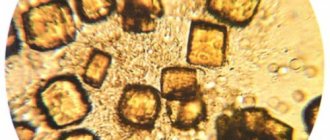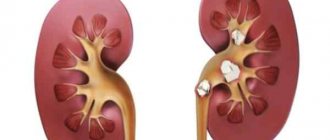If a person is found to have acetone in their urine, and the levels are significantly higher than normal, they should immediately undergo a full diagnostic examination and find out the root cause of this pathology. Often, acetone bodies are detected due to an unbalanced diet. In this case, drug treatment is not required, it is important to simply enrich your diet with healthy foods, and the problem will be solved on its own.
The appearance of acetone in the urine indicates an unhealthy diet or the development of dangerous diseases in the body.
Acetonuria - what is it?
In other words, an increased content of ketone bodies in the urine is called. They are the products of incomplete breakdown of fats and proteins in the human body.
Ketone bodies usually include acetoacetic and hydroxybutyric acid, as well as acetone.
Previously, this disease was very rare. Currently, acetone in urine is found in both adults and children.
In what cases does this disease not require treatment? In those cases where acetone in the urine is contained in low concentrations. At the same time, it is constantly excreted by the kidneys. What increases acetone in the urine? The answer to this question will be discussed in the next section of the article.
Why does acetonuria occur if diabetes mellitus is diagnosed?
Acetone in the urine of diabetics increases if the patient does not follow a diet.
If acetone is found in the urine of a diabetic, this often indicates that the person is not eating properly and is limiting himself in healthy foods, trying to control body weight. In this case, fats are broken down and metabolized when enzymes are activated. The load on the kidneys increases, and ketones are detected in a urine test. This condition can result in a diabetic coma. Therefore, it is important to balance your diet. If after this blood glucose does not normalize, and insulin therapy does not have an effect, you should immediately go to the hospital.
What causes this disease in adults?
If a person’s diet is dominated by protein and fatty foods, then acetone may form in the urine. This happens due to the fact that the body cannot completely break down fats and proteins.
Also, the causes of acetone in the urine in adults are a lack of food that contains carbohydrates, a strict diet. With the latter, you will need to stop fasting. Then you should consult a nutritionist. He will be able to choose the optimal diet.
Active physical activity can also affect the high content of acetone in the urine. In this case, you will need to adjust the load or contact a specialist who will help you do this.
The content of acetone in urine in diabetes is explained by a lack of carbohydrates in the body, which ensure complete oxidation of proteins and fats.
The tactics for managing a patient with this disease are selected depending on the cause. If a patient with diabetes followed a strict diet (although he is prohibited from doing this), then he will have to return to a normal diet. And then the content of acetone in the urine will become minimal. But there are cases when this indicator does not decrease with insulin injections and carbohydrate intake at the same time. Then we are talking about metabolic disorders. If urgent measures are not taken, a diabetic coma may occur.
Also, alcohol intoxication, eclampsia, chloroform anesthesia, precomatous state, stomach cancer, stenosis, increased levels of thyroid hormones are the reasons for increased levels of acetone in the urine.
When this disease appears during pathological processes in the body, a course of therapy is prescribed by the attending physician.
What is the source of this disease in children?
As a rule, a child has increased acetone in the urine due to malfunctions of the pancreas. This organ is formed before the age of 12. It is during this period that the pancreas cannot cope with all the blows that fall on it. If the work of this organ is suppressed, then it begins to produce much less enzymes than necessary.
Increased acetone in the urine of a child, what causes this? The main reasons are stress, hypothermia, physical activity or dietary errors. In addition, the sources of this disease are considered to be dysentery, diathesis, and uncontrolled use of antibiotics.
If acetone was found in a pregnant woman's tests?
Acetone appears in the urine of a pregnant woman due to toxicosis, renal pathology, or poisoning.
Women during pregnancy also often find traces of ketones in their urine.
If the substance is found in large quantities, then most likely this indicates renal abnormalities, which can be caused by infection or toxicosis. Advantages in the study results may arise due to dietary disturbances. But if the diet is adjusted and the woman excludes fatty, spicy and protein foods from her diet, she will be able to get rid of the pathology without special treatment.
About illness during pregnancy
This phenomenon can also be observed in pregnant girls. Acetone in the urine in early pregnancy is observed mainly due to toxicosis. With the latter, the main symptom is vomiting. In this case, it is necessary to restore the water-salt balance in the body. To do this, drink the liquid in small sips. And if that doesn’t work, then administer it intravenously. After these procedures, acetone in the urine will disappear within three days.
Other causes of this disease include negative environmental influences. Here we are talking about the environmental situation. In addition, reduced immunity and eating foods with preservatives and dyes are also sources of increased levels of acetone in the urine.
It is worth noting that heavy psychological stress in pregnant women has a negative impact on this indicator.
Be that as it may, in this case the cause of the disease should be identified and, accordingly, eliminated. Since acetonuria can negatively affect the health of the unborn child.
Treatment
The main direction of treatment in healthy people is to compensate for the lack of glucose in the blood. And for patients with diabetes, treatment is aimed at controlling blood sugar levels. The figure below schematically shows the algorithm of necessary actions if you smell acetone from your mouth or detect it in urine.
The figure schematically shows the algorithm of necessary actions in case of acetone odor from the mouth
Attention! The sooner treatment begins, the higher the chance of avoiding the development of diseases and their complications. Ignoring acetonuria can lead to life-threatening conditions.
Not too severe cases of the presence of acetone in the urine can be corrected at home yourself:
- First of all, you need to take a blood test to rule out the presence of diabetes;
- Give a cleansing enema and drink sorbents that will remove toxic substances from the gastrointestinal tract;
- For diseases accompanied by fever, children need to constantly replenish the level of glucose in the blood with the help of teas, compotes, glucose solutions, and dehydrating solutions.
Attention! In severe situations (such as convulsions, extreme weakness and drowsiness, uncontrollable vomiting, loss of consciousness), we recommend seeking medical help immediately.
To prevent the recurrence of acetonuria you need:
- Submit urine, blood for sugar, biochemistry tests;
- Undergo an ultrasound scan of the liver and pancreas;
- Follow a diet. Exclude the following products: Fast food;
- Fatty foods;
- Rich broths;
- Fatty meat and fish;
- Mushrooms;
- Dairy cream and sour cream;
- Oranges;
- Tomatoes;
- Cocoa;
- Coffee;
- Carbonated drinks;
- Any products that are saturated with preservatives and dyes and can increase the level of acetone in the blood and urine;
Symptoms of the disease
Signs by which the presence of acetone in urine can be determined include: mental depression, lethargy of the patient and, of course, an unpleasant odor when urinating.
Children may have slightly different symptoms of this disease. So they complain of weakness and headaches. The child also experiences loss of appetite. It may even be caused by water. This happens because he feels nauseous. Attacks of vomiting after each meal are the main sign of increased levels of acetone in the urine.
In addition, the main symptoms include cramping abdominal pain, pale skin, and increased body temperature. Added to all this is the smell of acetone from the mouth and urine.
What symptoms are you worried about?
You can detect acetonuria yourself; with it, the patient has:
- strong, pungent aroma of acetone (especially acute in the morning) when urinating and from the mouth;
- increase in temperature indicators;
- nervousness, tearfulness, irritability;
- presence of glucose in the blood;
- weakness;
- drowsiness;
- lack of appetite or, conversely, uncharacteristic hunger;
- pale or red skin;
- indigestion;
- vomiting and intestinal upset.
If the smell of acetone in the urine of an adult man or woman is persistent and does not go away even after normalization of nutrition, the entire body is checked for internal pathologies. Once a final diagnosis is made, appropriate treatment is prescribed.
How to determine the presence of a disease?
If acetone was found in urine, what does this mean? The answer to this question was given above. In this case, the specialist determines the cause of this disease.
Currently, the procedure for determining acetone in urine is a fairly simple procedure. If you have any suspicion of this disease, you should purchase special tests at the pharmacy. They are sold individually. But to ensure reliable results, you should buy several.
The test must be done within three days. The process is carried out in the morning. The urine is collected in a container and the test strip is placed into it. Then it is taken out. You will then need to wait a few minutes. If the strip turns pinkish, this indicates the presence of acetone in the urine. Purple color indicates increased performance.
The test cannot give specific numbers, but thanks to it you can find out about the presence of the disease. When confirmed, you must contact a specialist.
About urine analysis
Using this type of examination, you can also determine the presence of this disease.
When you contact a doctor, he gives a referral for a urine test. Acetone in urine is determined by this method.
For a more accurate result, it is necessary to collect a morning analysis.
The amount of ketone bodies is minimal at normal levels, which in laboratory studies equates to zero.
If acetone is detected in the urine, its amount is determined using plus signs.
One means that the reaction is weakly positive.
Two or three pluses indicate a positive reaction. But four signs indicate a high presence of acetone in the urine. The latter case requires mandatory consultation with a specialist and immediate therapy. Because there can be serious complications.
Which specialist should I contact for this ailment?
If there is acetone in the urine, what does this mean? Only a doctor can answer this question. But who exactly should you contact?
Thus, the presence of acetone in the urine can be caused not only by all kinds of diseases, but also by physiological consequences. The latter include overwork and an unbalanced diet. You should consult a specialist only if this ailment occurs due to any illness.
If a person complains, in addition to acetone in the urine, of constant thirst and the feeling of the oral mucosa being dry, then he should go to an endocrinologist.
When a patient, in addition to this illness, has symptoms such as fever, or even an infectious disease, then it is necessary to consult a therapist or infectious disease specialist. These specialists will determine the cause of the fever, conduct examinations and prescribe the correct treatment.
If a person has acetone in their urine after consuming alcoholic beverages, they should consult a narcologist. This specialist will prescribe treatment that will be aimed at removing toxic substances from the body.
If a pregnant girl complains, in addition to acetone in the urine, of edema, high blood pressure, protein in the urine and constant vomiting, then she should immediately contact her doctor, namely a gynecologist. Since here we are talking about the consequences of acetone in the urine, such as gestosis. It is very dangerous for the unborn baby, so you should not put off going to a specialist.
If a child has acetone in his urine along with diathesis, then the necessary treatment should be obtained from a pediatrician or an allergist.
When a person, in addition to acetone in the urine, experiences pale skin, rapid heartbeat, brittle nails and shortness of breath, he needs to go to a hematologist. Most likely we are talking about anemia here.
When a person is too thin, the presence of acetone in the urine is most likely due to exhaustion. In this case, you need to seek treatment from a rehabilitation specialist or therapist.
If there is acetone in the urine, as well as regular vomiting of eaten food, rotten belching, fatigue and diarrhea, you should go to a surgeon or gastroenterologist. Because here we are talking about stenosis of the esophagus or pylorus.
If a person complains of pain in the stomach, loss of appetite and fatigue, and acetone in the urine, then there is a suspicion of stomach cancer. For a complete examination, you should contact an oncologist.
Why is acetone in urine dangerous?
The essence of acetone syndrome lies in the manifestation of symptoms that appear if acetone in the urine is elevated. Vomiting, dehydration, lethargy, the smell of acetone, abdominal pain, etc. may occur. The disease is also called acetonemic crisis, ketosis, acetonemia. There are two types of acetone syndrome:
- Primary. It occurs for unknown reasons without affecting any internal organs. Excitable, emotional and irritable children can suffer from this disease. This type of acetonemic syndrome manifests itself in metabolic disorders, loss of appetite, insufficient body weight, sleep disturbances, speech function, and urination.
- Secondary. It is caused by other diseases. For example, infections of the intestines or respiratory tract, diseases of the digestive system, thyroid gland, liver, kidneys, pancreas. Acetone in the urine in children may be increased due to diabetes. If diabetes is suspected, a blood sugar test is required.
Increased acetone occurs in children under the age of 12 years, this is explained by the completion of the formation of the child’s enzyme system. If the syndrome recurs periodically, severe complications may appear in the form of:
- hypertension;
- diseases of the liver, kidneys, joints, biliary tract;
- diabetes mellitus
How is acetonuria treated?
It all depends on the complexity and reason for the process. In the simplest cases, it is necessary to make adjustments to your daily routine and diet. If the level of acetone in the urine is too high, the patient is hospitalized in a hospital.
First, a strict diet and plenty of fluids are prescribed. The liquid should be consumed frequently and in small quantities. And children should be given a small teaspoon of water every 7 minutes.
Raisin decoction or medications such as Regidron and Orsol help very well. You can also drink non-carbonated alkaline water and chamomile infusion.
If the patient cannot drink fluid due to severe vomiting, then intravenous administration is prescribed. In addition, the doctor may prescribe a Cerucal injection.
Absorbents are also good for removing toxins from the body. These include “White Coal”.
To alleviate the baby's condition, you can do a cleansing enema.
About the diet
If there is acetone in the urine, a certain diet must be followed. Meat can be consumed boiled or stewed. You can eat beef, turkey or rabbit.
It is allowed to eat borscht, low-fat vegetable soups and fish.
You can drink compotes, fruit drinks and juices. They help restore water balance.
The best fruit is quince. You can make jam or compote from it.
It is strictly forbidden to consume foods such as bananas, fried foods, sweets and spices.
What treatment is needed?
Drugs
If acetone in the urine of men or women has reached a critical level, urgent hospitalization of the patient is important, because such a symptom is extremely dangerous, and if the response is inadequate, it can cost a person’s life. Depending on the underlying causes of acetonuria, a drug therapy regimen is prescribed. To quickly remove ketones from the body, it is recommended to drink a solution of Regidron or Orosol. If a person is bothered by severe nausea and vomiting, Tsekural injections will help alleviate the condition. White coal or “Sorbex” helps rid the body of toxins.
Recipes from the people
Traditional medicine to get rid of acetone in the urine suggests drinking a decoction of chamomile or raisins.
Drinking plenty of herbs and fruits that have a cleansing and diuretic effect can help remove the element from the body faster. The following folk remedies have proven themselves well:
- Raisin decoction. Pour 2 tbsp. l. dried berries 300 ml of boiling water and bring everything to a boil. Then the fire is removed, and the product simmers on the fire for 10-15 minutes. Drink the drink throughout the day instead of tea or other liquid.
- Chamomile infusion. Boil 250 ml of water and add 2 tsp. dried chamomile flowers. Remove the heat and leave the drink until it reaches room temperature.
Nutritional therapy for acetone in urine in adults
For acetonuria, a diet is required. First of all, it is necessary to exclude fatty, spicy and fried foods, alcohol, chocolate and other sweets from the menu. Vegetarian dishes, lean meats and fish, compotes, fruit drinks and freshly squeezed juices are allowed, thanks to which it will be possible to restore fluid loss and saturate the body with vitamins and microelements.











